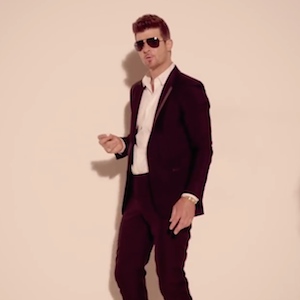Robin Thicke And Pharrell Williams "Blurred Lines" Lawsuit Going To Trial
Robin Thicke and Pharrell Williams are heading to trial after a judge denied their motion for summary judgment in the suit filed by Marvin Gaye’s estate.
Robin Thicke And Pharrell Williams Lose Round 1
In 2013, Gaye’s children, the heirs to his estate, filed suit against Thicke and Williams regarding their hit song, “Blurred Lines,” which they claim was copied from Gaye’s 1977 “Got To Give It Up.” Following a series of depositions, in which Thicke admitted he barely contributed to the writing of the song, U.S. District Court Judge John Kronstadt ruled that there was enough evidence to show that “elements of ‘Blurred Lines’ may be substantially similar to protected, original elements of ‘Got to Give It Up.’”
Kronstadt’s ruling allows the lawsuit to move forward and a court date has been set for Feb. 10, 2015.
Kronstadt also ruled that, going forward, only the sheet music registered with the Copyright Office would be protected by Copyright law – meaning that any backup vocals or other possible points of comparisons between the two songs not present on the sheet music will not be taken into consideration when determining similarities between the two songs.
"Blurred Lines" Copyright Lawsuit Headed To Trial
While this comes as a blow to Thicke and Williams, their lawyer Howard King said that the ruling was not unexpected. “The ruling is not surprising given the extraordinary difficulty in prevailing at the summary judgment stage, especially where each side offers conflicting opinions from multiple musicologists,” King said.
King appeared confident that Thicke and Williams would be cleared at trail, adding, “The jury will decide this case on the merits, limited to what is in the written composition, without being influenced by the sound recordings. Since the compositions at issue are completely different, we remain confident of prevailing at trial.”
Attorney for the Marvin Gaye estate Richard Busch disagreed with King, saying, “We believe the evidence of copying of Marvin Gaye’s legendary work ‘Got To Give It Up’ is overwhelming and now look forward to trying the case. We also disagree with Mr. King’s assessment that the Court ruled that there will be any limitation on what the jury considers at the trial, which involves a different analysis than what the Court analyzes on a motion for summary judgment.”
RELATED ARTICLES
Get the most-revealing celebrity conversations with the uInterview podcast!







Leave a comment